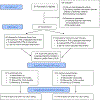Mood Instability in Youth at High Risk for Bipolar Disorder
- PMID: 35307538
- PMCID: PMC9728243
- DOI: 10.1016/j.jaac.2022.03.009
Mood Instability in Youth at High Risk for Bipolar Disorder
Abstract
Objective: Mood instability is associated with the onset of bipolar disorder (BD) in youth with a family history of the illness. In a clinical trial with youth at high risk for BD, we examined the association between mood instability and symptomatic, psychosocial, and familial functioning over an average of 2 years.
Method: Youth (aged 9-17 years) with major depressive disorder or other specified BD, current mood symptoms, and a family history of BD were rated by parents on a mood instability scale. Participants were randomly assigned to 4 months of family-focused therapy or enhanced care psychoeducation, both with medication management as needed. Independent evaluators rated youth every 4-6 months for up to 4 years on symptom severity and psychosocial functioning, whereas parents rated mood instability of the youth and levels of family conflict.
Results: High-risk youth (N = 114; mean age 13.3 ± 2.6 years; 72 female) were followed for an average of 104.3 ± 65.8 weeks (range, 0-255 weeks) after randomization. Youth with other specified BD (vs major depressive disorder), younger age, earlier symptom onset, more severe mood symptoms, lower psychosocial functioning, and more familial conflict over time had higher mood instability ratings throughout the study period. Mood instability mediated the association between baseline diagnosis and mother/offspring conflict at follow-up (Z = 2.88, p = .004, αβ = 0.19, 95% CI = 0.06-0.32). Psychosocial interventions did not moderate these associations.
Conclusion: A questionnaire measure of mood instability tracked closely with symptomatic, psychosocial, and family functioning in youth at high risk for BD. Interventions that are successful in reducing mood instability may enhance long-term outcomes among high-risk youth.
Clinical trial registration information: Early Intervention for Youth at Risk for Bipolar Disorder; https://clinicaltrials.gov/; NCT01483391.
Keywords: affective reactivity; depression; emotion regulation; family therapy; mania.
Copyright © 2022 American Academy of Child and Adolescent Psychiatry. Published by Elsevier Inc. All rights reserved.
Conflict of interest statement
Disclosure: Dr. Miklowitz has received research support from NIMH, the Danny Alberts Foundation, the Attias Family Foundation, the Carl and Roberta Deutsch Foundation, the Kayne Family Foundation, AIM Youth Mental Health, and the Max Gray Fund; and book royalties from Guilford Press and John Wiley and Sons. Dr. Weintraub has received research support from NIMH and AIM Youth Mental Health. Dr. Singh has received research support from Stanford’s Maternal Child Health Research Institute and Stanford’s Department of Psychiatry and Behavioral Sciences, NIMH, the National Institute on Aging, the Patient Centered Outcomes Research Institute, Johnson and Johnson, and the Brain and Behavior Research Foundation. She has reported serving on the advisory board for Sunovion and Skyland Trail, as a consultant for Johnson and Johnson, and has previously consulted for X, moonshot factory, Alphabet Inc., and Limbix Health. She has received royalties from American Psychiatric Association Publishing and Thrive Global. Dr. Walshaw has received research support from Blue-bird Biotech and Second Sight. Dr. Birmaher has received research support from NIMH and royalties from Random House, UpToDate, and Lippincott, Williams and Wilkins. Dr. Chang has served as a consultant on the speaker’s bureau for Sunovion. Dr. Schneck has received research support from NIMH and the Ryan White Foundation. Mr. Merranko has reported no biomedical financial interests or potential conflicts of interest.
Figures



Comment in
-
Editorial: Mood Instability: What It Is, Why It Matters, and What to Do About It.J Am Acad Child Adolesc Psychiatry. 2022 Oct;61(10):1224-1226. doi: 10.1016/j.jaac.2022.03.012. Epub 2022 Mar 25. J Am Acad Child Adolesc Psychiatry. 2022. PMID: 35346786

